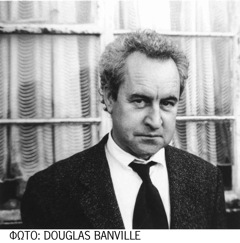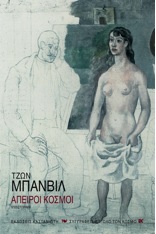“Bring back the ancient Gods”
John Banville is considered one of the greatest novelists in the world and the greatest living past master at using the English language, according to the opinion of many critics.
Irish author in Interview
by Elpida Pasamixali
Th e Irish writer, who was awarded the English Booker prize in 2005 for his book “The Sea”, has reverted to “noble form” with his book “The Infinities”, which is regarded by many as a “classic drama”. The author himself, disputes the word “reversion” but agrees that the creation of a classic piece of work is every writer’s aspiration.
e Irish writer, who was awarded the English Booker prize in 2005 for his book “The Sea”, has reverted to “noble form” with his book “The Infinities”, which is regarded by many as a “classic drama”. The author himself, disputes the word “reversion” but agrees that the creation of a classic piece of work is every writer’s aspiration.
“The Infinities” is also a novel with a special Greek interest as some of its heroes are ancient Greek Gods.
A non-conformist, a noble and witty man with an almost “Homeric” liveliness of speech and style which can surprise, John Banville speaks about the Greek heritage with admiration, expresses his opposition to monotheism and with an authentic Irish revolutionary spirit he urges us: ”Bring back the ancient Gods!” Bring them back…. “Greece is the cradle of all of us, in a way”
E.P.: How does it feel to come to Greece after 48 years? It’s been a very long time…
John Banville: I am of course greatly excited to be returning after so long. I remember my visits in the early Sixties with peculiar vividness. For one coming from the dark north the light of Greece was a revelation, and I experienced almost a spiritual awakening. Yet for all the difference between Greece and Ireland, I felt in a strange way that I had come home. How would I not?—Greece is the cradle of all of us, in a way.
E.P.: Do you recall anything from your first visit to Athens and the Greek islands?
John Banville: Athens I remember as very noisy—those car horns!—and not very prosperous; I suppose this time I shall find such things not much changed . . . Mykonos I fell in love with straight away. I recall a trip to Delos, over that Homeric wine-dark sea, and meeting a fishing boat with a sail the colour of dried blood suddenly appearing from behind a rocky headland, and thinking it might be Odysseus and his men heading off for wider seas.
E.P.: What do you expect to see now and what would disappoint you if it has disappeared in the meantime?
John Banville: I hope Greece and the Greeks, for all your present troubles, have not lost sight of your tremendous and noble heritage.
E.P.: In your new novel “The Infinities” you have created characters out of the Greek Gods. How come?
John Banville: Well, the book had its inspiration in a very great play by Heinrich von Kleist, Amphitryon, in which the god Zeus, accompanied by his son and sidekick Hermes, comes to earth to spend a night with the beautiful Alcmene, wife of the Theban general Amphitryon. I had intended to model the book quite closely on Kleist’s masterpiece, though only the skeleton of the original is still discernible in my novel.
E.P.: Why choose Hermes as the narrator of the story? Hermes is the messenger of the Gods. What is his message this time?
John Banville: Hermes has no message, he just carries messages of and for others. The same might be said of the artist, yes?
“Monotheism
Was and continues to be
A great disaster”
E.P.: What do you think about Greek mythology? What is, in your opinion, the most crucial difference between the pagan world of the Hellenes and the Christian world?
John Banville: I believe the Greek myths were the greatest and most comprehensive account of the world and our life in it. Monotheism was and continues to be a great disaster, in my opinion, as evidenced every day in newspaper reports of fundamentalist outrages, Muslim, Christian and other. Julian the Apostate was right: bring back the old gods, I say.
E.P.: Are you religious?
John Banville: No, but I like to think I have a strong feeling for the spiritual.
E.P.: How do you define “sin”?
John Banville: Causing damage to others, or to oneself.
“Mathematics
Is the language of the gods”
E.P.: Why is Adam Godley a mathematician? Is math a playfield for the gods?
John Banville: Because mathematics is the language of the gods, or as close to their language as mortal man can get.
E.P.: Many critics wrote that “The Infinities” marks your return to “high form”. Was a classic drama your goal?
John Banville: I’m not sure from where I was returning—I suppose they meant to mark my first Banville novel since the invention of Benjamin Black. Of course, all artists aim at creating a classic—otherwise, why bother?
E.P.: What is the difference when you write as Benjamin Black from when you write as John Banville?
John Banville: BB writes very fluently and speedily, Banville writes with a snail’s slowness, leaving a trail of slime across his pages, though a slime that sometimes glistens marvellously, or so I hope.
E.P.: According to Charles Baudelaire, “Always be a poet even in prose”; many critics regard you as one of the great living masters of English prose. What’s your guess on the future of the novel? Do you believe that the “digital civilization” will affect its form and contents?
John Banville: Yes, Baudelaire is right, one must always aspire to the condition of poetry. As my friend, the late John McGahern used to say, there is prose and there is verse, and then there is poetry, and poetry can happen in either. As to the novel as a form, it will surely survive, in however changed a way; human beings have an unquenchable thirst for stories, and the novel, no matter how sophisticated or advanced, always has a story to tell.
‘I am one of Gutenberg’s babies,
not a Gates virtual entity.’
E.P.: Are we close to the end of the printed form? Will the traditional paper media gradually disappear?
John Banville: I don’t understand the new technologies, so I can’t really form an opinion. I would be greatly grieved if the book as we know it were to disappear, replaced by electronic devices, but that may simply be because I am one of Gutenberg’s babies, not a Gates virtual entity.
“Both our countries
have been at a wild party,
and now it is over”
E.P.: Your trip to Greece coincides with the greatest financial crisis in this country. What do you think about this local and global recession?
John Banville: I am an artist, not an economist. There are enough commentators, without my adding to their dust-storm.
E.P.: Are any resemblances between the financial problems of Greece and Emerald Isle?
John Banville: I’m sure there are—both our countries have been at a wild party, and now it is over, and we have stumbled out into the ashen light of dawn. Time to work, now, and forget play for a while. As Noel Coward wisely said, work is more fun than fun.
 John Banville Quotes
John Banville Quotes
The English did many terrible things but one great thing you did was give us this extraordinary language … and it works for us.”
Someone said the best gift a man can give his son is to die young. When you think about it, it’s true. I was in my early 30s and I did feel freed by it, awful as it is to confess.”
Greek release of “The Infinities” by Kastaniotis Edition




